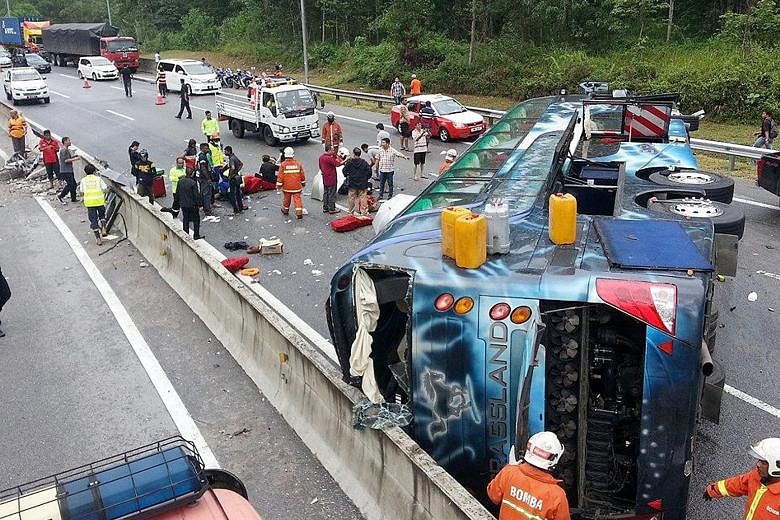Most severe road accidents across the border involve express buses that are speeding - but the Malaysian authorities are using technology in the hope of putting a stop to them.
In 2014, Malaysia's Land Public Transport Commission (Spad) made Global Positioning System (GPS) trackers compulsory on express buses. They can monitor a vehicle's location and speed, and alert bus operators if the driver concerned is speeding.
In July, the Road Transport Department also announced that all new express buses must be equipped with speed limiters.
"We believe that GPS tracking remains the most effective tool to monitor operator adherence to the speed limit, and Spad will continue to use this as the main mechanism to monitor compliance," a Spad spokesman told The Straits Times.
Spad's comments come after the Aug 31 Genting bus crash that killed one Singaporean and left nine injured. That double-decker, operated by Singapore-based Grassland Express and Tours, crashed into a road divider and overturned on the highway linking Karak, Pahang, and Kuala Lumpur. It was on the way to Singapore from Genting Highlands.
Spad said Grassland's licence was suspended for seven days pending investigations by the authorities. It will also conduct a compliance investigation into the company.
-
Past accidents
-
August 2016: A tour bus carrying 12 Singaporean passengers overturned on the Karak highway on its way back from Genting Highlands.
Accountant Lim Sia Thian, 62, suffered traumatic brain injuries and died.
The Malaysian driver and eight other Singaporeans were injured, including 52-year-old barber R. Manokaran, who was left in a critical condition and is still in hospital.
February 2015: Three Singaporeans and a permanent resident were among 27 people hurt in a coach crash on the North- South Expressway.
The bus crashed into the central steel road divider before ploughing into the opposing lane and ending up in a drain.
The Singaporean trio, aged between 63 and 67, got away with minor scrapes and bruises, but the permanent resident, Malaysian Teh Geok Hong, 56, suffered broken ribs.
April 2014: A Singapore-bound tour bus plunged into a ravine off Jalan Kuantan-Segamat in Pahang, killing a British tourist.
The other 38 tourists on the bus, including 20 Singaporeans and tourists from India, China, Britain and the United States, escaped with minor injuries.
Two drivers and a tour guide - all Malaysians - were also on board and suffered injuries. The bus skidded and spun a few times in the heavy rain before falling into a 15m-deep ravine.
Citing figures from the Malaysian Institute of Road Safety Research, Spad said speeding and speeding-related offences contributed to half of all severe accidents. Between 15 per cent and 18 per cent of such accidents were caused by driver fatigue.
Severe accidents are defined as those that involve either express buses, or more than two cars.
"Besides human factors such as speeding or fatigue, there can be other technical reasons involving faulty components or bad road conditions," Spad said.
The speed limits for heavy vehicles on Malaysian highways range between 80kmh and 90kmh.
According to the Express and Excursion Bus Association here, about 30 per cent of Singapore visitors to Malaysia travel to the country by express bus or coach.
Last year, 12.9 million Singaporeans visited Malaysia, according to data from Tourism Malaysia.
Five bus operators told The Straits Times that they believe devices such as GPS trackers and speed limiters would make coach travel to Malaysia safer.
Ms Susan Ng, executive director of Sri Maju Tours and Travel, said: "In the past, once the bus left, you wouldn't know what it was doing until it reached the destination. Now, we can track things like how fast it is going and if it's stuck in a jam."
Mr Micker Sia, managing director of WTS Travel, said the Malaysian authorities have been taking a firm stance on safety infractions after a spate of accidents in the past few years. He said: "Each time a speeding offence is detected, they will actually call us and ask to interview the drivers."
But Mr Bernard Tay, chairman of the Singapore Road Safety Council, said that with the ability to monitor their drivers, operators now have the responsibility of making sure their drivers comply with rules.
"This knowledge and evidence (from these trackers) is power, and employers have a responsibility to counsel or discipline drivers if they are caught speeding," said Mr Tay.


